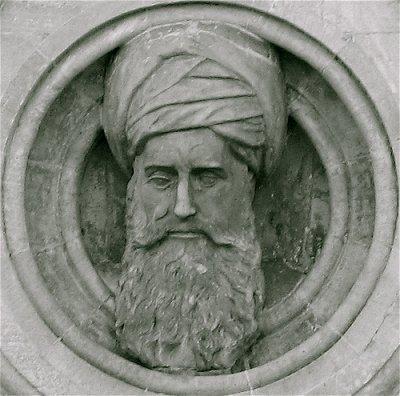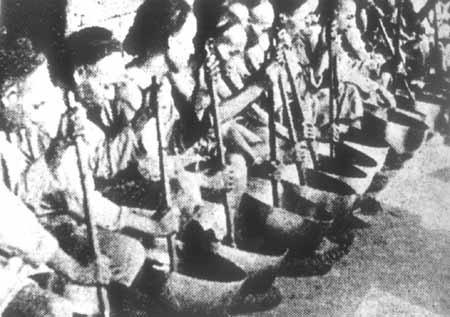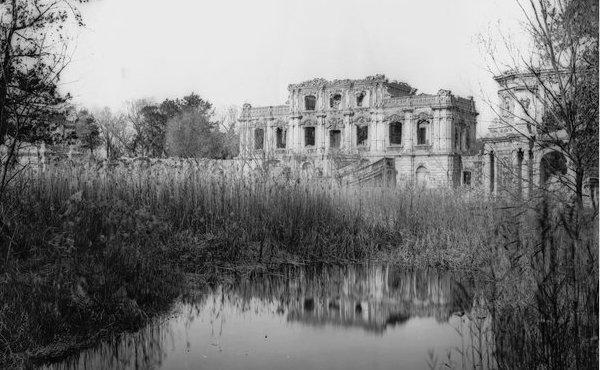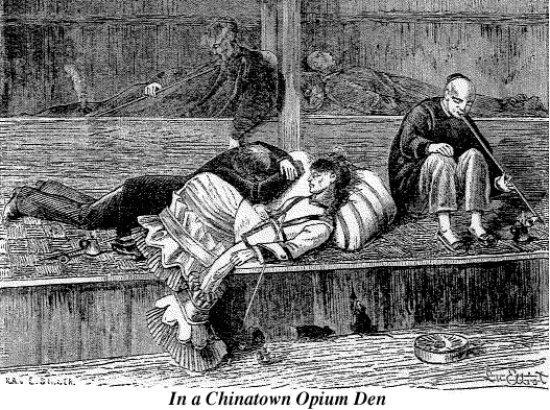The Jewish Monopoly on Opium Still Fuels Chinese
Resentment Today
|

A description of David Sassoon in Fortune Magazine
in the US, in the 1930s. |
The 99 year British lease on Hong Kong expired in
July, 1997, allowing China to take over its land
once again.
Hundreds of newspaper stories and TV reports covered
that event but not one revealed how England first
gained control of Hong Kong.
The truth lies buried in the family line of David
Sassoon, "The Rothschilds of The Far East," and
their monopoly over the opium trade.
Britain won Hong Kong by launching the opium Wars to
give the Sassoons exclusive rights to drug an entire
nation.
David Sassoon was born in Baghdad, Iran in 1792. His
father, Saleh Sassoon, was a wealthy banker and the
treasurer to Ahmet Pasha, the governor of Baghdad
(Thus making him the "court Jew" - a highly
influential position)
In 1829 Ahmet was overthrown due to corruption and
the Sassoon family fled to Bombay, India.
This was the strategic trade route to India's
interior and the gateway to the Far East.
In a brief time the British government granted
Sassoon monopoly rights to all manufactured cotton
goods, silk and most important of all - Opium - then
the most addictive drug in the world. |
|
| The Beginning of the Opium Trade |

This is what made David Sassoon a billionnaire in
the middle 1800's - 160 years ago. |
In the beginning, David Sassoon wanted to trade
cotton cloth with China in exchange for tea, but the
Chinese did not want the cotton that Sassoon wanted
to trade.
At the same time, Britain had an insatiable appetite
for Chinese tea, but the Qing Dynasty and its
subjects did not want to buy anything that the
British produced.
The Chinese were, however, willing to trade tea for
silver, since at that time China had a currency
fully backed by silver. But the government of Queen
Victoria did not want to use up the country's
reserves of gold or silver in buying tea.
However, Sassoon considered that the Chinese might
be susceptible to opium, which could then be
exchanged for tea. |
|
Armed with this knowledge, he sailed back to England to make
a new proposition to the Queen. And, on the advice of David
Sassoon, Queen Victoria decided to export opium from the
Indian Subcontinent to China where her military would
enforce its importation and use.
In Order to boost the trade David Sassoon forced the farmers
in Bengali to stop farming food and turn to growing opium
poppies. The climate in Bengali was very good for growing
opium and Sassoon's business flourished. He became a member
of the East India Company, a firm owned and run by Jews out
of the City of London. So successful was the opium business
that the tax the East Indian Company paid to England paid
for all English wars between 1831 and 1905.
Opium Was a "Jewish Business"
The
Jewish Encyclopedia of 1905 states that Sassoon expanded his
opium trade into China and Japan. He placed his eight sons
in charge of the various major opium exchanges in China.
According to the 1944 Jewish Encyclopedia: "He employed only
Jews in his business, and wherever he sent them he built
synagogues and schools for them. He imported whole families
of fellow Jews. . . and put them to work."
Sassoon's sons were busy pushing this mind-destroying drug
in Canton, China, and their trade expanded alarmingly.
Between 1830 - 1831 they trafficked 18,956 chests of opium
earning millions of dollars. Part of the profits went to
Queen Victoria and the British government. In the year 1836
the trade increased to over 30,000 chests and drug addiction
in coastal cities became endemic.
|

David Sassoon - China's own original "Merchant of
Death". |
In 1864, the Sassoons imported 58,681 chests of
opium which brought in over 20 million pounds.
By 1880 it had skyrocketed to 105,508 chests, making
the Sassoons the richest Jews in the world next to
the Rothschilds.
The Sassoons were now licensing opium dens in each
British occupied area with large fees being
collected by their Jewish agents.
And many of these Jewish agents were the Chinese
Jews of Kaifeng.
These Jews had immigrated to China along the Silk
Road hundreds of years ago and had so intermarried
with the Chinese that they looked entirely Chinese.
But they still were practicing Jews and were thus
the perfect Chinese agents for the Sassoons.
The entire trade was controlled by Jewish families
only. Sassoon would not allow any other race to
engage in "the Jews' business" of importing and
selling opium.
Opium was strictly a Jewish monopoly, but these Jews
were working under British passports. |
|
The
corrupt British monarchy honored them with privilege and
knighthood - to the disgrace of the Crown. To this day the
Sassoons are in the history books as "great developers" of
India, but the source of their vast wealth is never
mentioned - the destruction and impoverishment of the
population of China.
According to a 1930s edition of Fortune Magazine (USA), the
Sassoon Family monopolized more than 70% of the opium trade
and controlled every nook and corner of opium traffic
between India and China. This is also consistent with
research and observations according to Edward LeFevour in
"Western Enterprise in Late Ch'ing Dynasty China". According
to these sources, in the middle 1800s, the Sassoon group was
acknowledged to be the major holder (more than 70%) of all
opium stocks in India and in China. |

A "command performance" - Chinese middle and upper
class forced at gunpoint to smoke the Sassoon's
opium. The guns being conveniently provided by the
British military. |
The Sassoons were not the only Jews involved in the
trade; much of the remaining 30% was shared with
other Jewish families.
There was Hartung (哈同) - who is listed as "the
richest of the rich" after the Sassoons, Hardoon,
Kadoorie, Arnold, Abraham, Ezra and Solomon, among
others.
For the Sassoon's profitable troubles, Queen
Victoria rewarded them with Hong Kong and the New
Territories as their import and distribution base.
The time has come for the entire world to condemn
the British colonial masters and these Jewish
"merchants" for their evil crimes of forcing opium
by the shiploads onto the Chinese.
By all accounts, the Jewish opium merchants did not
take NO for an answer, but instead used the violent
power of the British military to kill all of the
'uppity' Chinese who dared to refuse the opium.
These were "command performances", persisted in
until addiction took over. See the accompanying
photo.
|
|
And Then The Opium Wars - Euphemistically called "The
Boxer Rebellion"
China's
government, not too surprisingly, objected to the
large-scale importation of narcotics into their country by a
foreign power, provoking Britain to declare war.
In 1839, the Manchu Emperor ordered that it be stopped. He
named the Commissioner of Canton, Lin Tse-hsu, to lead a
campaign against opium. Lin seized 2,000 chests of Sassoon
opium and threw it into the river. An outraged David Sassoon
demanded that Great Britain retaliate. And because the
Sassoon family had married into the Rothschild family who
controlled the English economy, this demand had powerful
Jewish backers in England.
Thus, the Opium Wars began with the British Army fighting as
mercenaries of the Sassoons. They attacked cities and
blockaded ports. The Chinese Army, decimated by 10 years of
rampant opium addiction, proved no match for the British
Army. The war ended in 1839 with the signing of "The Treaty
of Nanking." This included provisions especially designed to
guarantee the Sassoons the right to enslave an entire
population with opium. The "peace treaty" included these
provisions:
- Full legalization of the opium trade in China,
- Compensation from the opium stockpiles confiscated by
Lin of 2 million pounds,
- Territorial sovereignty for the British Crown over
several designated offshore islands.
The Sassoons Use the British Army to Drug An Entire Nation
British
Prime Minister Palmerston wrote Crown Commissiner Captain
Charles Elliot that the treaty didn't go far enough. He said
it should have been rejected out of hand because: "After
all, our naval power is so strong that we can tell the
Emperor what we mean to hold rather than what he would cede.
We must demand the admission of opium into China's interior
as an article of lawful commerce and increase the indemnity
payments and British access to several additional Chinese
ports."
Thus, China not only had to pay Sassoon the cost of his
dumped opium, but reimburse England an unheard sum of 21
million pounds for the cost of the war!
This gave the Sassoon's monopoly rights to distribute opium
in port cities. However, even this was not good enough and
Sassoon demanded the right to sell opium throughout the
nation. The Manchus resisted and the British Army again
attacked in the Second Opium War fought 1858 - 1860.
Palmerston declared that all of interior China must be open
for uninterrupted opium traffic.
The British suffered a defeat at the Taku Forts in June 1859
when sailors, ordered to seize the forts, were run aground
in the mud-choked harbor. Several hundred were killed or
captured. An enraged Palmerston said: "We shall teach such a
lesson to these perfidious hordes that the name of Europe
will hereeafter be a passport of fear."
The Destruction of the Yuanmingyuan |

This photo taken by Ernst Ohlmer in 1873 is believed
to be one of the earliest
photos of the
Yuamningyuan. |
In October, the British besieged Peking.
When the city fell, British commander Lord Elgin,
ordered the temples and other sacred shrines in the
city sacked and burned to the ground as a show of
Britain's absolute comtempt for the Chinese.
In early October of 1860, the commanders of the
British and French forces held a conference outside
the gates of the Garden of Perfect Brightness - the
Yuanmingyuan.
It was situated on the western outskirts of Beijing,
where they agreed to share whatever they could loot
and to destroy the balance.
As the primary residence of five Qing emperors,
Yuanmingyuan contained hundreds of palaces, temples,
libraries, theaters, pavilions, chapels, gazebos and
galleries filled with priceless artworks,
antiquities and personal possessions. |
|
There followed an orgy of indiscriminate plunder in which
anything that could not be carted off was destroyed.
On Oct. 18, British forces were ordered by Lord Elgin - son
of the Lord Elgin who removed the marble friezes from
Greece’s Parthenon - to inflict a final blow, with fire, as
revenge for the Chinese refusal to permit the importation of
opium that was devastating their country, though ostensibly
for the deaths of some British and Indian prisoners in
Chinese captivity.
Because Yuanmingyuan was so vast - roughly five times the
size of Beijing’s Forbidden City and eight times that of
Vatican City - it took an entire infantry division of nearly
4,500 men, including four British regiments and the 15th
Punjabis, many weeks to set it aflame and finally render it
to utter destruction.
Gilded beams crashed, porcelain roofs buckled and ash filled
the lakes, as so many embers snowed down on Beijing that the
entire city seemed on fire, where and the clouds of smoke
were so dense they eclipsed the sun.
Upon hearing the news, the ailing 30-year-old Xianfeng
emperor vomited blood; less than a year later he was dead.
"It was a sacrifice of all that was most ancient and most
beautiful," acknowledged Robert McGhee, chaplain to the
British forces and a participant in, and defender of, the
destruction. "It is gone, but I do not know how to tear
myself from it."
Arguably the greatest concentration of historic treasures in
the world, dating and representing a full 5,000 years of an
ancient civilisation, were either looted or totally
destroyed. And all of this was done to protect the exclusive
opium concessions granted to the Jewish Sassoons of Britain,
and the revenue they generated for the crown.
God Save the Queen, and God Bless "His Chosen People".
The Yuanmingyuan is an unforgettable shame in the hearts of
the Chinese people, and a reminder for the whole world that
such destruction of human cultural heritage should not
happen again.
You can read more on the Yuanmingyuan:
(1) Jewish Opium and British Imperialism:
The Wanton Destruction of China's Yuanmingyuan.
(2) China Remembers a Vast Crime by the West:
The Destruction of the Yuanmingyuan in Beijing.
The British and Jewish "Peace Treaties" and the
Origin of British Hong Kong
In the
new "Peace Treaty" of Oct.25, 1860, the Sassoons (backed by
the force of the British military) were assigned rights to a
vastly expanded opium trade covering seven-eights of China.
England took not only the Hong Kong peninsula as a colony
but also large sections of Amoy, Canton, Foochow, Ningbo and
Shanghai.
Hong Kong (as a colony) was founded by the British
specifically for a life of crime. When Britain gave the
Jewish Sassoon family the exclusive franchise to distribute
opium in China, the family needed a base of operations for
the importing, processing, packaging and distribution. Hong
Kong was forcibly "leased" solely for the Sassoon family's
opium business.
This was the bloody origin of Hong Kong's 155 years as a
British colony.
Readers may not be generally aware of the behind-the-scenes
negotiations in London that preceded the return of Hong Kong
to China. The "Iron Lady" (perhaps referring to the chastity
belt, and perhaps not) Margaret Thatcher, decided at the
last minute she wasn't returning Hong Kong to anybody. The
word is that her ministers panicked and browbeat her into
concession, for fear of starting World War III.
And for sure it might have done. After all of the past
humiliation, there is no way China would have accepted a
betrayal or default on that agreement. The Chinese
government later admitted it would have just moved in with
troops and taken Hong Kong back. And you couldn't blame
them.
The Origin of British Hong Kong Banking
After
the British established Hong Kong as a colony in the
aftermath of the Opium Wars, local merchants felt the need
for a bank to finance the growing opium trade with China, so
they established (by special permit from the British) the
Hongkong and Shanghai Banking Corporation - HSBC today -
"The World's Bank".
This is the same bank that almost 30 years ago built the
world's most expensive building as their head office in Hong
Kong - 1 billion US dollars.
The Sassoons Destroyed Everything They Touched
Money
for these people was only a tool for making more money, no
matter the disasters wrought upon the Chinese - or indeed
any other nation.
Sir Albert Sassoon, the eldest of David Sassoon's sons took
over the family "business" empire. He constructed huge
textile mills in Bombay that paid true slave wages. This
early example of the "off-shoring of industries" continued
after World War One and ended up putting mills in
Lancashire, England out of business with thousands losing
their jobs to the cheap labor of the Sassoons in India.
This did not stop Queen Victoria from having Albert knighted
in 1872. After all, the Sassoons could prosper only after
they had subverted the governance of China, whereupon
Britain empowered the Sassoons to destroy and impoverish the
people, for the glory of the British Empire.
Solomon Sassoon moved to Hong Kong and ran the family
business there until his death in 1894. Later, the entire
family moved to England because with modern communications
they could operate their financial empire from their
luxurious estates in London. They socialized with royalty
and Edward Albert. Sassoon married Aline Caroline de
Rothschild in 1887 which linked their fortune with that of
the Rothschilds. The Queen then also had Edward knighted.
All 14 of the grandsons of David Sassoon were made officers
during World War One and thus most were able to avoid
combat.
David Sassoon became a naturalised British citizen in 1853.
He kept the dress and manners of the Baghdadi Jews, but
allowed his sons to adopt English manners. His son, Abdullah
changed his name to Albert, moved to England, became a
Baronet and married into the Rothschild family. All the
Sassoons of Europe are said to be descendants of David
Sassoon.
The Ubiquitous American Connection . . .
Warren
Delano was a senior partner in Russell & Company, whose
ships carried the opium that was imposed on China.
The reason Russell & Company were allowed to transport and
trade in opium around Canton was that they were a Jewish
company and did not interfere with the business of Sassoon's
East India Company. The market was large enough for both.
Russell & Company got their opium from Afghanistan through a
harbor in Turkey.
Delano said later he could not pretend to justify the opium
trade on moral grounds, "but as a merchant I insist it has
been . . . fair, honorable and legitimate", and "no more
objectionable than the importation of wines and spirits to
the US."
He returned to America a rich man, and gave his daughter
Sara in marriage to a James Roosevelt, the father of
Franklin Delano Roosevelt, the American President.
Roosevelt's fortune was inherited from his maternal
grandfather Warren Delano. Roosevelt always knew the origin
of the family fortune but neither side of the family cared
to discuss the source of their great wealth.
The Aftermath
The
British-protected Sassoon opium trade brought death and
destruction to millions and still plagues Asia to this day.
The forcible introduction of opium into China was not some
minor event. It extended for much more than 100 years, and
totally devastated an entire nation of a billion people,
weakening it to the point where it was a walkover for Japan
to invade. In addition to the social and financial
destruction, and the reversal of China's development, these
events led eventually to the civil war and Mao's ascendance,
and so much else since.
Nothing else in China's history has had such an impact on
what and where China is today. This brutal period of
unconscionable imperialism and evil profiteering is surely
one of the greatest two or three events in China's 5,000
years of history.
Countless tens of millions of familes were destroyed;
fortunes lost, daughters prostituted, production collapsed,
the economy crashed. The treasures and heritage of 5,000
years of a peaceful society ravaged by madness and
destruction of the British and French. The toll was
unimaginable. The British Crown and the Jewish Sassoons
conspired to turn an entire nation of people into drug
addicts of the worst kind, solely to satisfy their greed and
lust for power.
This drug trade totally eviscerated China's social fabric,
virtually destroying not only the country but families and
all of society. And, by most estimates, the forcible
imposition of opium on The Middle Kingdom by Britain, and
the clever and brutal marketing by the Sassoon Jews, set
back China's development at least 75 years.
And, using their magical technique of putting all of the
blame of their sins upon a scapegoat, to this day the Jews
claim that the Opium Trade of China was the fault of the
British simply because the Sassoons all had British
passports. And to this day, many Chinese believe them.
And the British East India Company itself was owned, at
least in large part, by these same families - the
Rothschilds, the Sassoons, and others.
Any resentment that the Chinese might feel toward the
British today, at least due to the imposition of opium, is
partially misdirected. A fair share should be directed to
these Jewish merchants.
|

A typical opium den in old China. |
Nowhere in British or Jewish history are the truths
of this wantonly immoral family and the
evil-inspired colonisation told.
Instead, the Jewish books and encyclopedias all
praise the Sassoons for their "great contribution"
to Indian society, without a mention of the
God-forsaken criminality of these people.
And of course, the sentimental British still revel
in fond memories of their once-great Empire - when
they ruled the world and the Seven Seas - while
concurrently suffering a pathological amnesia for
the unconscionable evils they committed.
It was due to this, to the weakened and almost
helpless state of the country, that other foreigners
- and then the Japanese - could move in and attempt
to colonise this entire great country.
But there's more. Iimperial wars require heavy
financing. It is true that Japan raided the
treasuries of every country they invaded, to obtain
funds for further expansion. |
|
War
financing can be difficult to trace, but it is almost a
certainty that much of their financing came from the Jewish
bankers who have always financed wars - the Rothschilds,
Joseph Schiff and, in this case, the Sassoons - who used
their profits from destroying and weakening China to finance
the Japanese invasion and further colonisation of China.
It is popular lore that China welcomed and gave harbor to
many Jews during their troubled times in Germany during the
Second War, but I have seen no hard evidence that this was
the case. It would appear that "China" did not invite,
receive or harbor Jews during those periods, that this is
yet another common (and deliberate) misconception.
Evidence suggests that the influx of Jews into China was
arranged by the Sassoons, the Hardoons, probably Schiff, and
other Jewish families, in agreements made with the Japanese
military occupation which they were helping to finance.
Virtually all of those Jewish immigrants came primarily to
Shanghai, which was at the time well outside the control of
China's government which had nothing whatever to say about
the influx of immigrants there, Jews or otherwise.
|
Bibliography
http://en.wikipedia.org/wiki/David_Sassoon
http://www.useless-knowledge.com/1234/jan/article129.html
http://app1.chinadaily.com.cn/star/2001/0510/cu18-2.html
http://www.earnshaw.com/shanghai-ed-india/tales/t-sass.htm
http://www.cjss.org.cn/wangwen.htm |








































